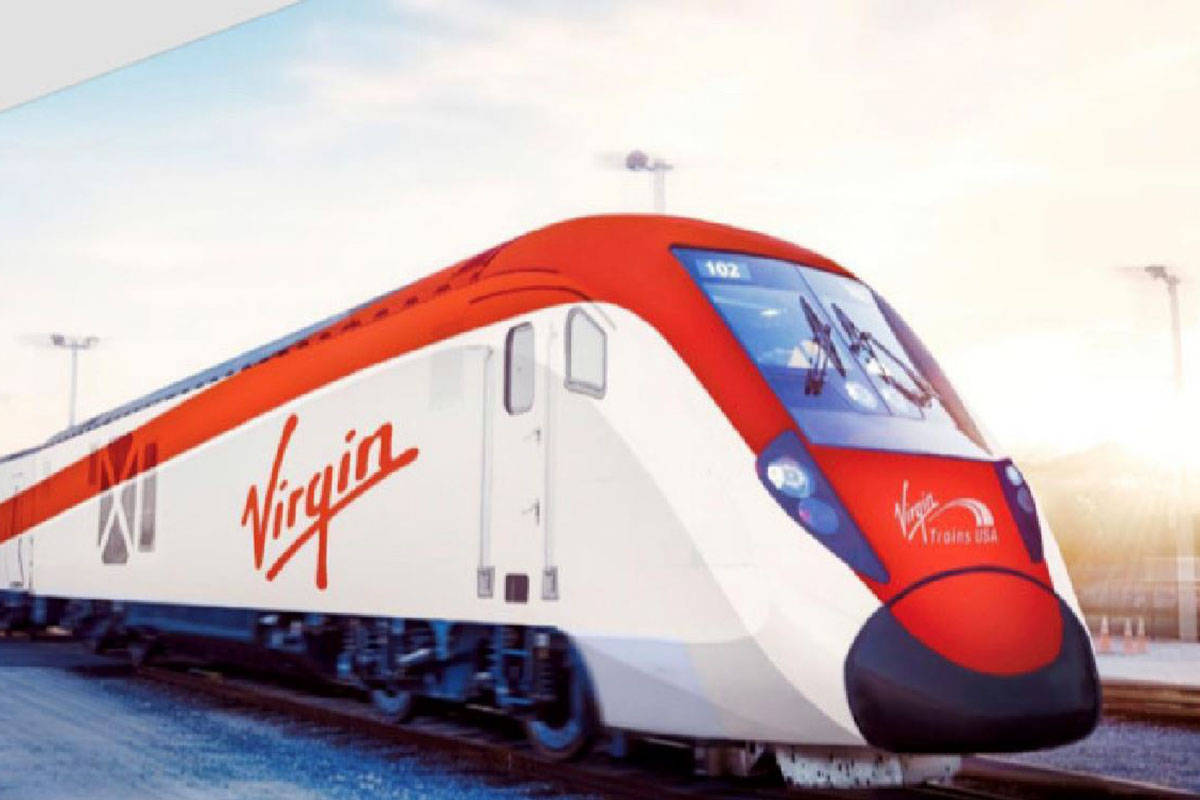Nevada OKs $200M in bonds for Vegas-to-SoCal high-speed train
After being docked for around 15 years, the long-talked about high-speed rail line between Las Vegas and Southern California appears ready to leave the station.
The state Department of Business and Industry on Friday unanimously approved $200 million in tax exempt bonds to go toward Virgin Trains USA’s planned high-speed train project.
“This project is a long time coming to Nevada and I’m pleased to take this step forward to bring this vision to reality and bring additional jobs to our state,” Gov. Steve Sisolak said in a statement. “This plan creates jobs without using taxpayer dollars and without impacting our state’s ability to finance future projects, and will allow a new, convenient mode of transportation between Nevada and California.”
Virgin can market the private activity bonds for up to four times the amount of the $200 million in bonding authority, for a total of $800 million, per Internal Revenue Service guidelines.
In April, a California finance committee approved the allocation of $600 million in tax-exempt bonds for the project, which can be marketed for a total of $2.4 billion in tax-free, private equity bonds, per IRS regulations.
Additionally, the U.S. Department of Transportation in March approved $1 billion in tax-free private bonds for the project.
The bond approvals are reliant upon all Virgin bonds being issued by Sept. 30.
$4.8B project
The $4.8 billion rail line would run from Victorville, California, to Las Vegas. Possible future extensions of the line to Rancho Cucamonga and Palmdale, California, are in the works, which would open up access to the Los Angeles area via Metrolink trains.
This month, Virgin entered into a lease agreement with California to use existing right of way around Interstate 15 for the project.
The high-speed service would include up to 32 trains daily that could travel the 180-mile corridor in approximately 90 minutes. Each train set would have the capacity to accommodate up to 600 passengers.
The line would mainly run in between the north and southbound lanes on I-15 on the California side, transitioning east of the interstate just after entering Nevada.
The rail line would have its own corridor in Nevada, allowing it to avoid adding railroad crossings as it enters the Las Vegas Valley.
Las Vegas station
Plans call for the construction of a two-story train station on 14 of 110 acres owned by Virgin and located off Las Vegas Boulevard between El Dorado Lane and Robindale Road.
Anthony Marnell, minority owner of affiliate XpressWest, told the board the company would consider including an affordable housing project on the 110 acres of land where the station will be located. The XpressWest high-speed rail project was purchased in 2018 by Brightline, which later rebranded itself as Virgin Trains.
Multiple classes of service will be offered to travelers who will be able to reserve seats and travel at times that fit their schedules. Onboard food and beverage services will be available, along with free high-speed Wi-Fi.
Virgin plans to break ground on the project by the end of the year, with service slated to begin by the end of 2023.
Job creation
In Nevada, the project is estimated by Virgin to create 10,000 jobs during the construction phase and 350 permanent jobs once it’s operating.
Sisolak praised the job creation and sees the project as a key piece to the state moving forward from the coronavirus-affected economy.
“We’re going to get a lot of jobs,” Sisolak said during the meeting. “I’m very thankful and very thankful of the jobs this is going to create as we move on in this COVID recession we’re dealing with right now and try and get our people back to work.”
The investment in the infrastructure and the ongoing operations are expected to have an economic impact in the state of more than $2 billion, Virgin estimates.
“This is a historic investment and a huge boost of momentum for a project that will generate thousands of new construction jobs at a pivotal time for Nevada,” said Sarah Watterson, chief development officer for XpressWest (Virgin Trains) in a statement. “Large scale construction projects are a critical piece of rebuilding our economy, and private activity bonds are a perfect mechanism to incentivize the private sector to deliver public benefits.”
Contact Mick Akers at makers@reviewjournal.com or 702-387-2920. Follow @mickakers on Twitter.























